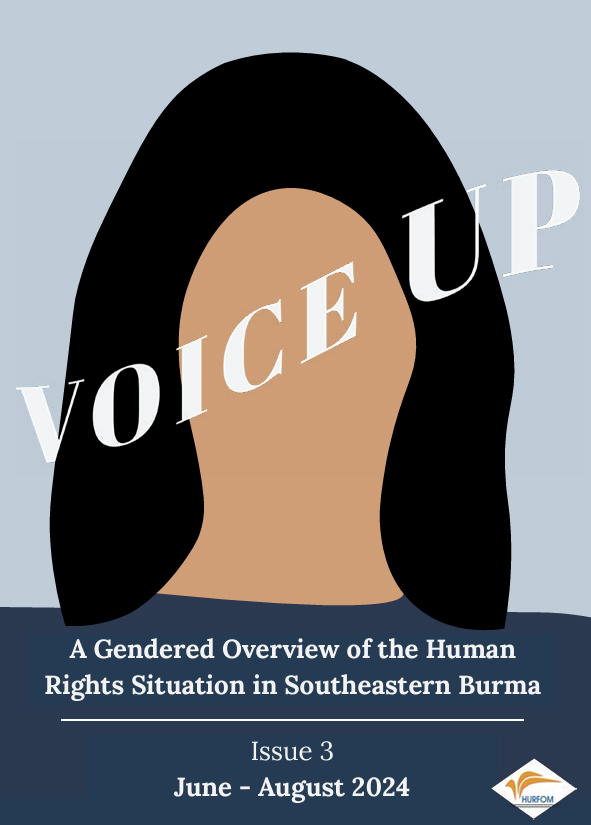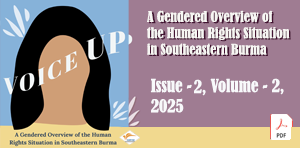“Voice Up Issue 3” Update: Gendered Human Rights Overview in Southeastern Burma (June-August 2024)
September 10, 2024
Introduction
This report is the third in a series of quarterly updates and analyses, combining data collected from the ground by the Women and Child Rights project of the Human Rights Foundation of Monland (HURFOM). Before the attempted coup in Burma on 1 February 2021, HURFOM published similar content in a bulletin-style format under the title Voice Up. The Women and Children’s Rights project is of utmost importance as it seeks to monitor the situation of women and children in Mon areas and southern Burma and how it relates to the UN Convention on the Elimination of All Forms of Discrimination Against Women (CEDAW) and the UN Convention on the Rights of the Child (CRC).
Field staff collect and distribute information and data to our local and international networks. The findings empower and educate women and children in the Mon community by providing information on their rights, according to CEDAW and CRC, and encouraging them to participate in the struggle to protect and enforce their fundamental freedoms.
Activities under the project include:
- A bi-annual Mon and Burmese-language journal titled: Our Rights Journal
- Capacity building, which provides training in women’s and children’s rights and training trainers in both areas.
- Data collection and documentation on topics such as the trafficking of women and children and violence against women and child soldiers.
The cases of human rights violations perpetrated against women presented in this briefing paper are indicative of decades of military impunity. Despite their many challenges, this report is a testament to the dedication and perseverance of the women human rights defenders leading the documentation efforts. [Please continue read this in pdf]
Situation Overview for Women in Burma: June – August 2024
Across Burma, women continue to resist and stand against the military junta. Since the attempted coup on February 1, 2021, women have defied gender stereotypes and pioneered a new path for inclusivity in the nation’s human rights movement. Their courage amid ongoing attacks by the Burma Army highlights their dedication to ending military rule. In areas targeted by the Human Rights Foundation of Monland (HURFOM) – including Mon State, Karen State, and the Tanintharyi Region – the Burma Army’s criminal actions continue. During this reporting period, there was a 30% increase in human rights violations in July compared to June.
The monsoon season’s rains have posed additional challenges for accessing those trapped due to conflict, who are in urgent need of food, medicine, and clean water. As the humanitarian situation worsens, women and children remain most at risk. According to data from the Karen National Union (KNU), between January and June 2024, over 130 people were killed and 439 wounded in Kawthoolei by junta attacks. The junta has also destroyed 23 monasteries, 14 schools, two clinics, two hospitals, and more than 1,024 homes through airstrikes, drones, and artillery attacks. Most victims are women and children caught in their homes and villages. Over one million people have been internally displaced in Karen State alone since the failed coup.
Violence against women extends beyond the battlefields and into junta-run prisons. On June 12, HURFOM reported protests inside Kyaikmayaw Central Prison in Mon State after the denial of emergency treatment to an injured prisoner. Female political prisoners demanded care for an inmate who had been ordered to perform welding work during a rainstorm, leading to electrocution and severe injuries. Following the incident, junta forces entered the prison and increased security. On June 15, 146 political prisoners were transferred from Kyaikmayaw Central Prison, where they were beaten and banned from family contact. At least five female prisoners sustained severe injuries, and more than 30 were held in solitary confinement. Additionally, over 80 female prisoners were accused of possessing illegal substances and mobile phones.
Women in military detention face increased risks of sexual harassment, assault, and rape. Their safety and security are repeatedly compromised, and the denial of medical treatment to political prisoners is deeply concerning. In June, The Irrawaddy reported that young female political prisoners were strip-searched at juvenile centers under the junta’s Ministry of Social Welfare. At the end of August, the Assistance Association for Political Prisoners (AAPP) called for urgent protection for female prisoners, stating that their situation has reached a “life-threatening status.”
The plight of women and girls is particularly troubling, especially given the lack of rule of law. Pro-democracy activists should not be targeted or arrested for peaceful actions and the right to protest. The corrupted legal system under the military junta must be held accountable for its continuous disregard for human rights.
In addition, the junta’s forced conscription drive began in February 2024, and five months later, it was announced that women aged 18 to 27 are now being enlisted. Forced conscription poses serious risks to the well-being and security of women. According to residents in Myeik, personal data collection for conscription registration began in various neighborhoods in Myeik City, Tanintharyi Region, between May and June. HURFOM field workers reported data collection across neighborhoods including Myeik Taung, Innlay-Myine, Kyan Taw, Won Dan, Myit Nge, and Kan Hpyar. In Innlay-Myine, pregnant women and mothers were also registered. In other neighborhoods, men and women aged 18 to 35, including those with families, were registered for conscription.
These violations are just a sample of the junta’s brutality and their disregard for the freedoms and civil liberties of women and children. An appendix at the end of this report provides a comprehensive list of victims documented by HURFOM from June to August 2024. [Please continue read this in pdf]




















































